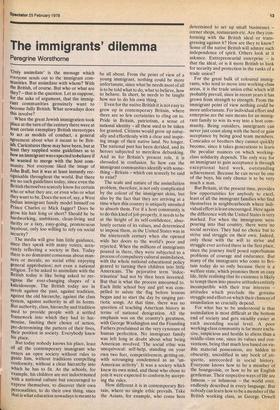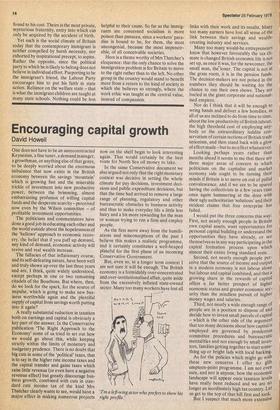The immigrants' dilemma
Peregrine Worsthorne
'Only assimilate' is the message which everyone sends out to the immigrant communities. But assimilate with whom? With the British, of course. But who or what are they? — that is the question. Let us suppose, for the sake of argument, that the immigrant communities genuinely want to become fully British. What nowadays does this involve?
When the great Jewish immigration took Place at the turn of the century there were at least certain exemplary British stereotypes to act as models of conduct, a general agreement about what it meant to be British. Caricatures these may have been, but at least they supplied some guidelines as to how an immigrant was expected toibehave if he wanted to merge with the host community. Not everyone liked the image of John Bull, but it was at least instantly recognisable throughout the world. But there are no such guidelines today, since even the British themselves scarcely know for certain Who or what they are, or even who or what they want to be. Does the son of, say, a West Indian immigrant family model himself on Prince Charles or Mick Jagger? Does he grow his hair long or short? Should he be hardworking, ambitious, clean-living and thrifty or a lazy, easy-going, promiscuous layabout, only too willing to rely on social security?
The media will give him little guidance, since they speak with many voices, accurately reflecting a society in flux. Today there is no dominant consensus about manners or morals; no social ethic enjoying general approbation; not even a national religion. To be asked to assimilate with the British today is like being asked to recognise the ever-changing shapes of a kaleidoscope. The British today are in revolt against the past, against tradition, against the old hierarchy, against the class System, against authority in all its forms. But authority, class, hierarchy and tradition used to provide people with a settled framework into which they had to harmonise, limiting their choice of action, Pre-determining the pattern of their lives, their position in society. Everybody knew his place.
But today nobody knows his place, least of all the contemporary immigrant who enters an open society without rules to guide him, without traditions compelling conformity, without a clear hierarchy into Which he has to fit. At the schools, for example, his children are not indoctrinated With a national culture but encouraged to express themselves, to discover their own Personalities, to do their own thing, since that is what education nowadays is meant to be all about. From the point of view of a young immigrant, nothing could be more unfortunate, since what he needs most of all is to be told what to do, what to believe, how to behave. In short, he needs to be taught how not to do his own thing.
Even for the native British it is not easy to grow up in contemporary Britain, where there are so few certainties to cling on to. Pride in Britain, patriotism, a sense of national identity — all these used to be taken for granted. Citizens would grow up naturally and effortlessly with a clear and inspiring image of their native land. No longer. The national past has been derided, and its heroes subjected to merciless debunking. And as for Britain's present role, it is shrouded in confusion. So how can the immigrant communities identify with something — Britain — which can scarcely be said to exist?
The scale and nature of the assimilation problem, therefore, is not only complicated by the colour of the immigrant skins, but also by the fact that they are arriving at a time when this country is uniquely unsuited to absorb them. For if a host community is to do this kind of job properly, it needs to be at the height of its self-confidence, absolutely certain of its values, and determined to impose them, as the United States was in the nineteenth century when she opened wide her doors to the world's poor and rejected. When the millions of immigrants poured in there, they were subjected to a process of compulsory cultural assimilation, with the whole national educational policy geared to turning their children into little Americans. The pejorative term 'indoctrination' had not by then been invented. But that is what the process amounted to. Each little school boy and girl was compelled to salute the flag before lessons began and to start the day by singing patriotic songs. At that time, there was no question of teaching American history in terms of national denigration. All the emphasis was on the country's greatness, with George Washington and the Founding Fathers proclaimed as the very cynosure of human perfection. No immigrant family was left long in doubt about what being American involved. The social ethic was unequivocal: self-help, standing on your own two feet, competitiveness, getting on, with scrounging condemned as an 4unAmerican activity'. It was a society which knew its own mind, and those who chose to join it were expected to conform by accepting the rules.
How different it is in contemporary Britain, where no single ethic prevails. Take the Asians, for example, who come here determined to set up small businesses — corner shops, restaurants etc. Are they conforming with the British ideal or transgressing against it? How are they to know? Some of the native British will admire such independence of spirit. Others look at it askance. Entrepreneurial enterprise — is that the ideal, or is it more British to look for security and protection in the ranks of a trade union?
For the great bulk of coloured immigrants, who tend to move into working-class areas, it is the trade union ethic which will probably prevail, since in recent years it has grown from strength to strength. From the immigrant point of view nothing could be more unfortunate. For individual effort and enterprise, are the sure means for an immigrant family to win its way into a host community. Being outsiders, immigrants can never just coast along with the herd or gain acceptance by being good team members. Comrades or brothers they cannot quickly become, since it takes generations to learn the peculiar nuances on which workingclass solidarity depends. The only way for an immigrant to gain acceptance is through exceptional hard work, outstanding achievement. Because he can never be one of the boys, his only chance is to be very much a man.
But Britain, at the present time, provides few opportunities for anybody to excel, least of all the immigrant families who find themselves in neighbourhoods where individual effort is least encouraged. Here again the difference with the United States is very marked. For when the immigrants were pouring into that country, there were no social services. They had no choice but to strive and struggle on their own. Indeed, only those with the will to strive and struggle ever arrived there in the first place, since the journey itself posed superhuman problems of courage and endurance. But many of the immigrants who come to Britain today do so only because there is a welfare state, which promises them an easy life, little realising that its existence is likely to tempt them into passive attitudes entirely incompatible with their true interests — attitudes which preclude the genuine struggle and effort on which their chances of assimilation so crucially 'depend.
For what has to be understood is that assimilation is most difficult at the bottom end of society and gets steadily easier at each ascending social level. A poor working-class community is far more exclusive, suspicious and hostile to aliens than a middle-class one, since its values and conventions, being that much less based on visible material possessions, are hidden in obscurity, uncodified in any book of etiquette, unrecorded in social history. Everyone knows how to be a member of the bourgeoisie, or how to be an English gentleman. Their respective ways of life are famous — or infamous — the world over, endlessly described in every language. But nobody can learn how to be a member of the British working class, as George Orwell
found to his cost. Theirs is the most private, mysterious fraternity, entry into which can only be acquired by the accident of birth.
Yet such is the social climate of Britain today that the contemporary immigrant is neither compelled by harsh necessity, nor exhorted by inspirational precept, to aspire. Rather the opposite, since the political party to which he is likely to belong does not believe in individual effort. Purporting to be the immigrant's friend, the Labour Party encourages him to put his faith in state action. Reliance on the welfare state — that is what the immigrant children are taught at many state schools. Nothing could be less helpful to their cause. So far as the immigrants are concerned socialism is more poison than panacea, since a workers' paradise is bound to be, for them, the most uncongenial, because the most impenetrable, of all conceivable societies.
Here is a theme worthy of Mrs Thatcher's eloquence: that the only chance to solve the immigration problem is for Britain to move to the right rather than to the left. No other group in the country would stand to benefit more from a return to the kind of society in which she believes so strongly, where the work ethic was taught as the central value, instead of compassion.



































 Previous page
Previous page